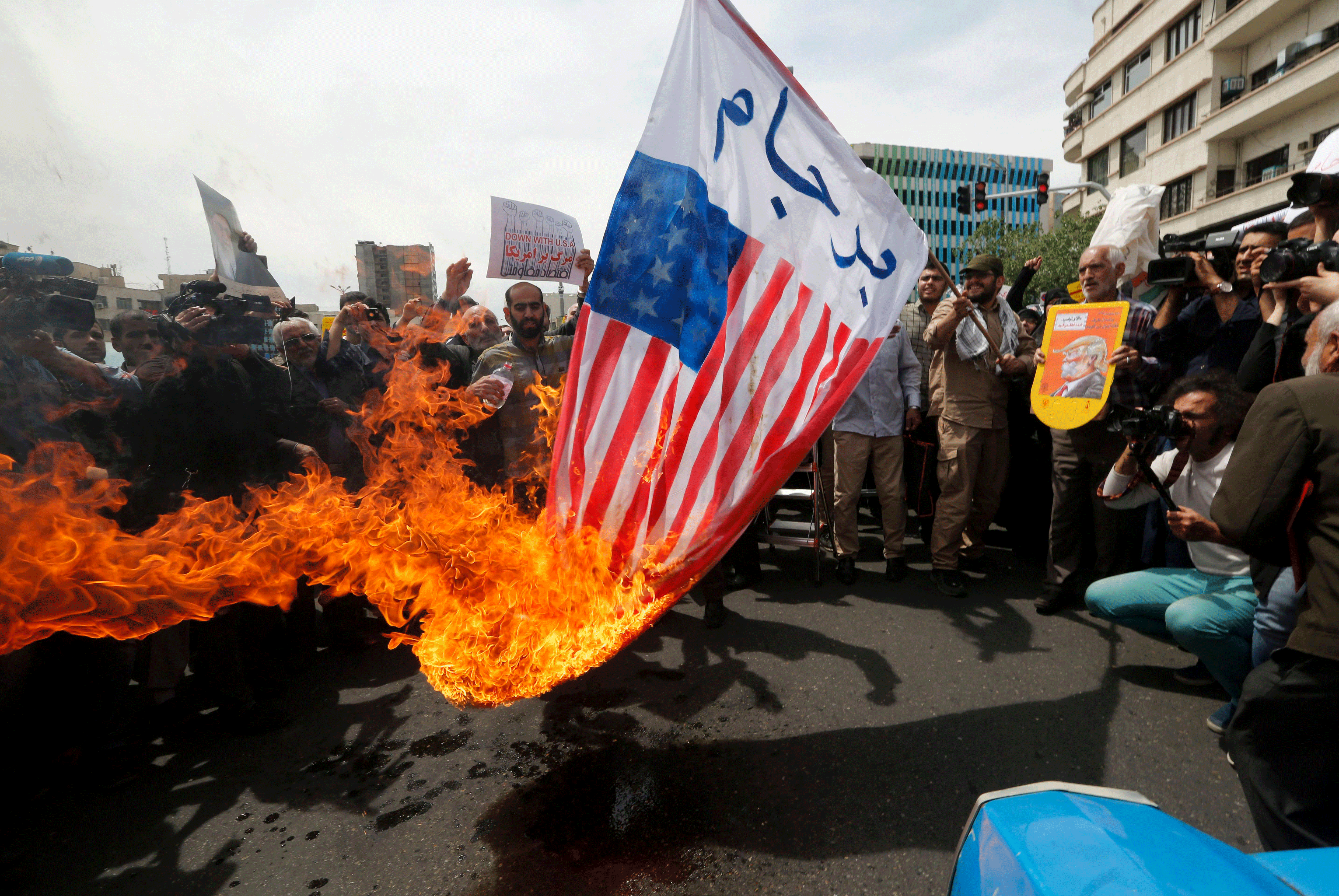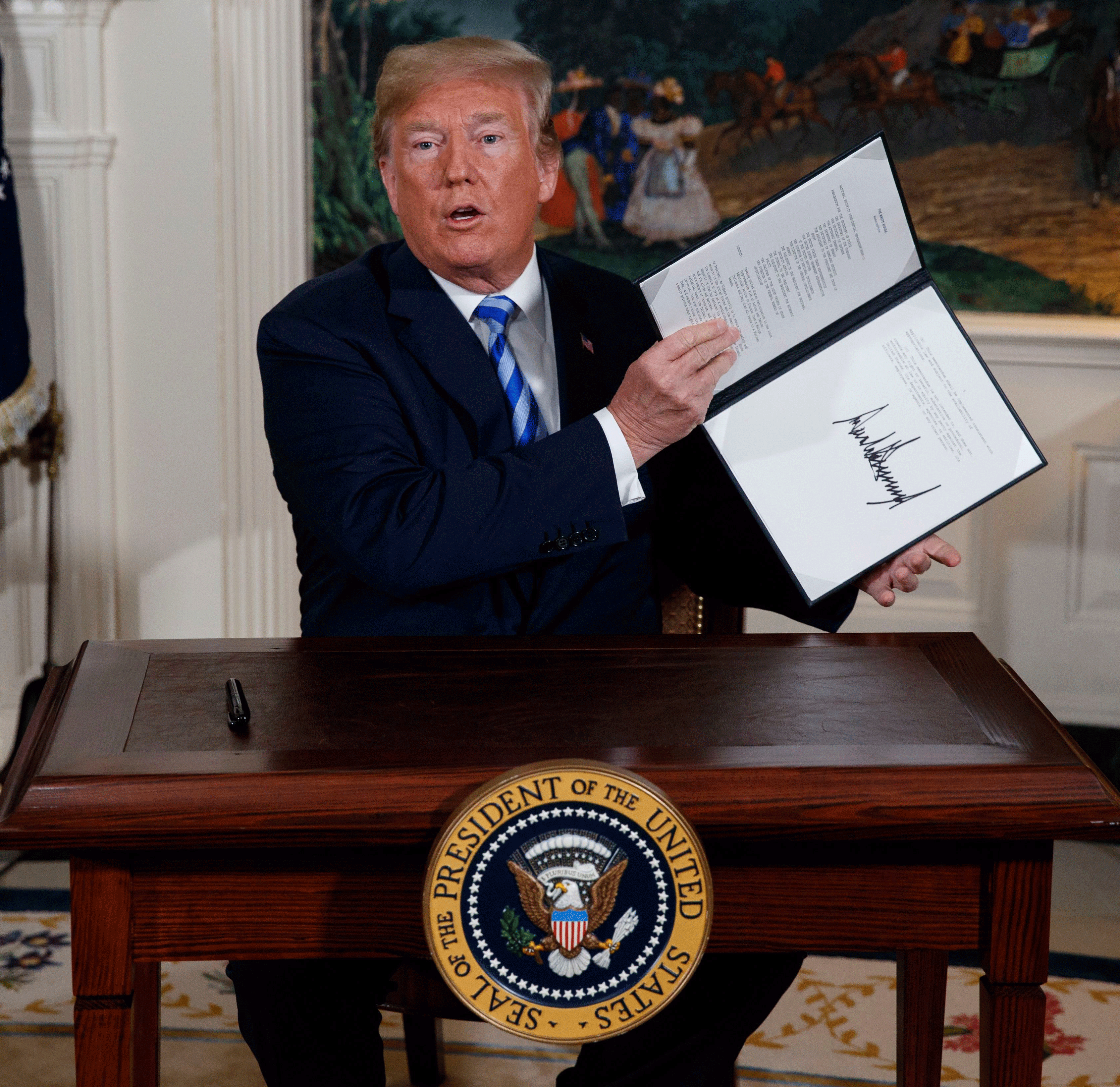Political brinkmanship drives decisions on sanctions and puts allies at loggerheads. Eduardo Reyes looks at the advisory and enforcement efforts that trail in the geopolitical wake.
One job vacancy is approaching its first anniversary with no indication of being filled. Signing off as the UN Security Council’s sanctions ombudsperson for the ISIL (Da’esh) and Al-Qaida Sanctions Committee, Catherine Marchi-Uhel had a few parting thoughts for secretary general Antonio Guterres. ‘My successor will not have an easy task,’ she wrote. Attempts by committee members to interfere with her independence left the impression that for her office ‘full fairness and transparency cannot be guaranteed’.
Tempted to apply? It is not a role for the faint-hearted. Across the board, sanctions and sanctions law sit on the fault line of international political conflicts, with US sanctions against Iran now front of mind. The EU’s dominant trio – the UK, Germany and France – refuse to side with the US, and the resultant dissonance with the US position has put many businesses, sanctions lawyers say, ‘between a rock and a hard place’.
THE LOW DOWN
The Iran sanctions row between the US and EU has put business deals worth billions at risk and placed companies and their legal advisers ‘between a rock and a hard place’. While precedent points to US licences and waivers that allow apparently irreconcilable differences to be fudged, the unpredictability of the Trump administration may mean such accommodations are not a given. And what of the UK’s decision to leave the EU? The UK has driven the bloc’s sanctions policy, and now faces divergence from both US and EU rules. Post-Brexit legislation governing sanctions, currently going through parliament, is ‘skeleton’ in form, allowing ministers to add powers the Treasury has long sought. Sanctions litigation is expected over non-performing contracts drawn up in better times, and the cost to business of these sanctions bust-ups will be huge – possibly including custodial sentences for executives who fall foul of divergent regimes.
So, following on from a period where sanctions lawyers were advising on ways to grow trade as diplomatic chills thawed, they are once again being asked to lead clients away from trades that are suddenly the subject of sanctions. The task is often to cut losses and liaise with enforcement agencies.
As Aline Doussin, trade partner at international firm Hogan Lovells, puts it: ‘The row over Iran and the resulting sanctions will create a substantial compliance burden for EU businesses, especially as the EU and the US sanctions regimes are drifting apart. As a result, there will likely be an increase in disputes arising out of conflict-of-law litigation. In particular, we are likely to see disputes over the legitimacy of terminating contracts on the basis of US “extraterritorial” sanctions, especially when non-US companies such as those in the EU and in Iran are involved.’
Rock vs hard place
As Peters & Peters partner Anna Bradshaw notes: ‘US and EU [regimes] were never perfectly aligned. There was always a degree of dissonance.’ But ‘a direct conflict has not been seen on a large scale since the mid-90s when we had huge controversies over Cuba, Iran and Libya’.
The EU and the UK wished to carry on trades that the US had proscribed, notably through the 1996 Helms-Burton Act, which was extraterritorial in its reach. Helms-Burton had provisions designed to punish businesses breaching US sanctions that had any link to the US, whether based in the US or not.
The UK and the EU responded with ‘blocking legislation’ – measures exempting their businesses from the intended reach. The EU also filed a claim challenging the terms of US sanctions with the World Trade Organization that initially led to the US threatening withdrawal from the WTO’s dispute resolution mechanisms. A diplomatic solution followed, whereby the EU dropped its claim and the US issued waivers for most arrangements that would have caught European companies by the reach of Helms-Burton alone.
Sanctions lawyers, of course, see such a compromise as a possible way forward. Barrister Rachel Barnes of Three Raymond Buildings, who is dual US-UK qualified and made sanctions law the subject of her PhD, says: ‘What is interesting about the discord between the US and EU over Iran is that none of this is new.’ The US is allowing businesses three to six months to comply. As Barnes notes: ‘What we see here is a lot of tub-thumping. [But] the wind-down period allows… a lot of time for a political solution.’
Serious intent
Such a solution could resolve the inter-ally conflicts at any time. But without one there are reasons why differences between the US and EU carry more serious consequences for businesses than last time round.
That is because of ‘secondary sanctions’, whereby trades in (for example) dollars anywhere in the world mean the US authorities may claim a breach and apply sanctions on a business – even though the ‘primary trade’ had no link to the US. That matters more now than it did in the 1990s, Bradshaw notes: ‘Today, financial systems are so interconnected. Banks, regardless of a US presence, will still fear the US regulator.’ What is more, she adds: ‘Compared to primary sanctions, [secondary sanctions] are incredibly easy to breach.’
What, then, can companies affected by sanctions rely on? The uncertainties are huge, Doussin says: ‘The law doesn’t determine how businesses should comply with sanctions. It does set out the penalties for breach of financial sanctions, including with respect to Iran. So, the usual due diligence recommended by enforcement agencies and regulators will still apply in the context of Iran. As there are severe penalties for breaching sanctions, businesses should always exercise extra caution to ensure they are not only in line with current restrictions, but can also anticipate any further US legislative changes.’
The partial lifting of Iranian sanctions led to trade deals worth billions – $16.6bn for Boeing alone. While hoping for a political solution, businesses must now plan for the very worst.
WANTING OUT
The UK’s Sanctions and Anti-Money Laundering Bill states it will enable ‘sanctions to be imposed where appropriate for the purposes of compliance with UN obligations or other international obligations or for the purposes of furthering the prevention of terrorism or for the purposes of national security or international peace and security or for the purposes of furthering foreign policy objectives’. It will ‘make provision for the purposes of the detection, investigation and prevention of money laundering and terrorist financing and for the purposes of implementing standards published by the Financial Action Task Force relating to combating threats to the integrity of the international financial system; and for connected purposes’.
The bill faces criticisms levelled at other Brexit-related legislation. Peters & Peters partner Anna Bradshaw says: ‘It struck me as opportunistic to use Brexit as an excuse to push through a wish list of powers the Treasury (pictured) has wanted to receive for a long time.’
Bradshaw describes it as ‘a strange beast, a skeleton bill – bare bones with nothing of substance’. The ‘all-important bits are to be regulations adopted by ministers’ she says. ‘It’s clearly a great example of “Henry VIII” legislation, and the justification for that is sanctions and anti-money laundering policy needs to be flexible. That’s true of sanctions up to a point, but it’s not true of money laundering.’
Finally, Bradshaw notes: ‘I fear the bill will come in before the expiry of the transition period.’
WilmerHale’s Christopher David advises: ‘Companies should be identifying as quickly as possible any current commercial relationships within Iran. Once these contracts have been identified, companies should take immediate steps to terminate the relationship and conclude any existing contracts. This may be challenging in circumstances where the underlying contracts do not have effective sanctions-related provisions.’

Companies must plan for disputes because, Linklaters lawyer Phillip Richardson warns: ‘In large multinationals this is not always straightforward.’
HFW partner Daniel Martin confirms: ‘The key challenge is going to arise where there are ongoing performance obligations which would infringe sanctions when they are reintroduced, but the contract does not include language which excuses performance. In those circumstances parties may need to fall back on arguments about frustration and/or illegality, and these may prove difficult.’
Another challenge, Martin notes, ‘will relate to removal of assets, personnel and funds from Iran – this may not be straightforward’.
A very British problem
And then there is Brexit which, coinciding with a sanctions crisis, has exacerbated the UK’s problem in seeking to respond to a US position with which it does not concur. UK policymakers and businesses must now devise a response to a situation where we are at loggerheads with a bellicose US, yet possibly departing from the EU’s approach.
UK legislation designed to deal with sanctions post-Brexit is controversial, and for divergent UK/EU regimes, licences to trade will be a focus.
Licences and waivers were the day-to-day solution to the US and EU mid-90s clashes, and they remain central to the operation of differential sanctions regimes. These relate to primary sanctions and secondary sanctions – licences and waivers for secondary sanctions for financial trades are harder to obtain because of the possible link to money laundering and terrorist funding.
Even now, the semi-farcical scenario where a trade in goods is licensed, but payment for them is not, is an issue. Barnes has advised on such breaches, including for a ‘well-known company’ where a new compliance officer spotted a potential problem. ‘The underlying business trade wasn’t restricted,’ she says, ‘but the funds [transfers] were. The export was fine. The payment was not. It needed a licence from the Treasury.’

Such ‘inadvertent’ errors are even more common for smaller businesses, she adds, and can result in investigations that pick through 10 years of trades.
Post-Brexit, even where UK and EU sanctions regimes are similar in intent and design, and mean to work in concert, licences could be a serious issue. Bradshaw points out: ‘A licence granted in the UK today could be applicable throughout the EU. [In future] you may well have different outcomes on local applications submitted in the EU and UK.’
Barnes directs attention to the legislative upshot of Brexit for sanctions law – the Sanctions and Anti-Money Laundering Bill (currently making its way through parliament). This establishes a regime to ensure the UK can pursue a sanctions regime that is not dependent on the EU post-Brexit.
Criticisms of other Brexit-related legislation also apply to this bill (see box, above). In addition, it cannot turn back the clock to the 1980s and 1990s, says Barnes, a time when although the UK was a (then) EEC member, UK policy ‘was much more autonomous’. Policy has since ‘coalesced’ around EU action. With EU sanctions positions ‘the UK has been a driver’, she notes – one factor that points to ‘a tension’ between the UK and EU positions in the future.
‘Post-Brexit, we won’t have that traction,’ she warns.
That could mean a triple break in western sanctions approaches – a fracture that leads to the US, UK and EU taking three irreconcilable positions, with trading businesses expected to complete the impossible task of complying with all three. The situation for businesses may be all the more serious because, as Martin points out: ‘Commercial lawyers do not always appreciate that the sanctions legislation creates criminal offences… with scope for custodial sentences and unlimited fines.’
Treasury superintendence
Before the US and Europe fell out over Iran, the UK had moved to reform the Treasury’s superintendence of sanctions rules. It created the Office of Financial Sanctions Implementation (OFSI). At its inception, OFSI reflected the atmosphere in which sanctions were being lifted, not least against Iran – an atmosphere of cautious hope in the context of still-strict rules. OFSI’s homepage still features a picture of a freighter, at full steam, and OFSI blog posts have titles such as ‘enforcement and engagement’.
‘I’m head of enforcement and engagement for the Office of Financial Sanctions Implementation,’ writes the OFSI’s David McLean. ‘This may sound like a contradiction, but I think enforcement and engagement are natural fits.’
Lawyers are not openly critical of OFSI, but its operation has presented frustrations some are willing to share anonymously. ‘On intention, OFSI is good,’ says one. ‘The problem is caused by the fact that, as a new body, it has a lot of catching up to do.’
On legal representation, OFSI comes in for particular criticism. To be paid for advice to a sanctioned person, a licence is needed. The Asset Freezing Unit, OFSI’s predecessor, would grant ‘open-ended’ licences – albeit carrying reporting requirements. ‘It all made sense and was fine,’ runs a typical assessment. ‘But with OFSI, the policy has changed.’
OFSI decides that just by advising, a lawyer is conferring an ‘economic benefit’ on a client. ‘So before opening a matter you need to apply for a licence,’ the Gazette has been told. ‘OFSI took the view it could not grant open-ended licences. It wants to know what you will advise the client about… They would ask for legally privileged information. We would say we can’t, especially if what we are being asked about is a challenge to the Treasury.’
There are now disputes about the length of time allotted for each licence, resulting in ‘enormous problems regarding the running of litigation when you are running out of licence time’. What is more: ‘Licence applications are not quick. One took a year. It was becoming unworkable. Consequently, clients were going elsewhere. If you need legal advice, you can go and get any EU lawyer – why would you go to a UK lawyer?’
OFSI decisions on licences, runs another complaint, are taken by civil servants ‘with minimal legal input’.
What now?
Sanctions lawyers are advising clients in contexts that involve huge uncertainties. The US track record indicates that, tough-sounding headlines achieved, licences and waivers may provide a solution. But past form cannot be relied upon.
As WilmerHale’s David observes: ‘President Trump has indicated that his administration will aggressively enforce the reinstated secondary sanctions and companies would be wise to take these statements into account. The counterpoint is that the US government will face diplomatic and economic pressure when it actually comes to enforcing the new sanctions against a company doing business in Iran that might have its principal place of business in the territory of a close ally. These are political rather than legal questions and companies should approach business in Iran with extreme caution until the position is clearer.’
The difficulty, Barnes says, is ‘reading the tea leaves. The Trump administration is very headline-grabbing’. But Trump already has some form on sanctions compromises, she points out: ‘With the Russian oligarchs [sanctioned], licences were [later] issued to do business with Rusal. There may be a similar situation, where the US bark is worse than its bite.’
As the UK heads out of the EU, it has an even greater interest than the EU27 in such accommodations being reached – and quickly.





























No comments yet